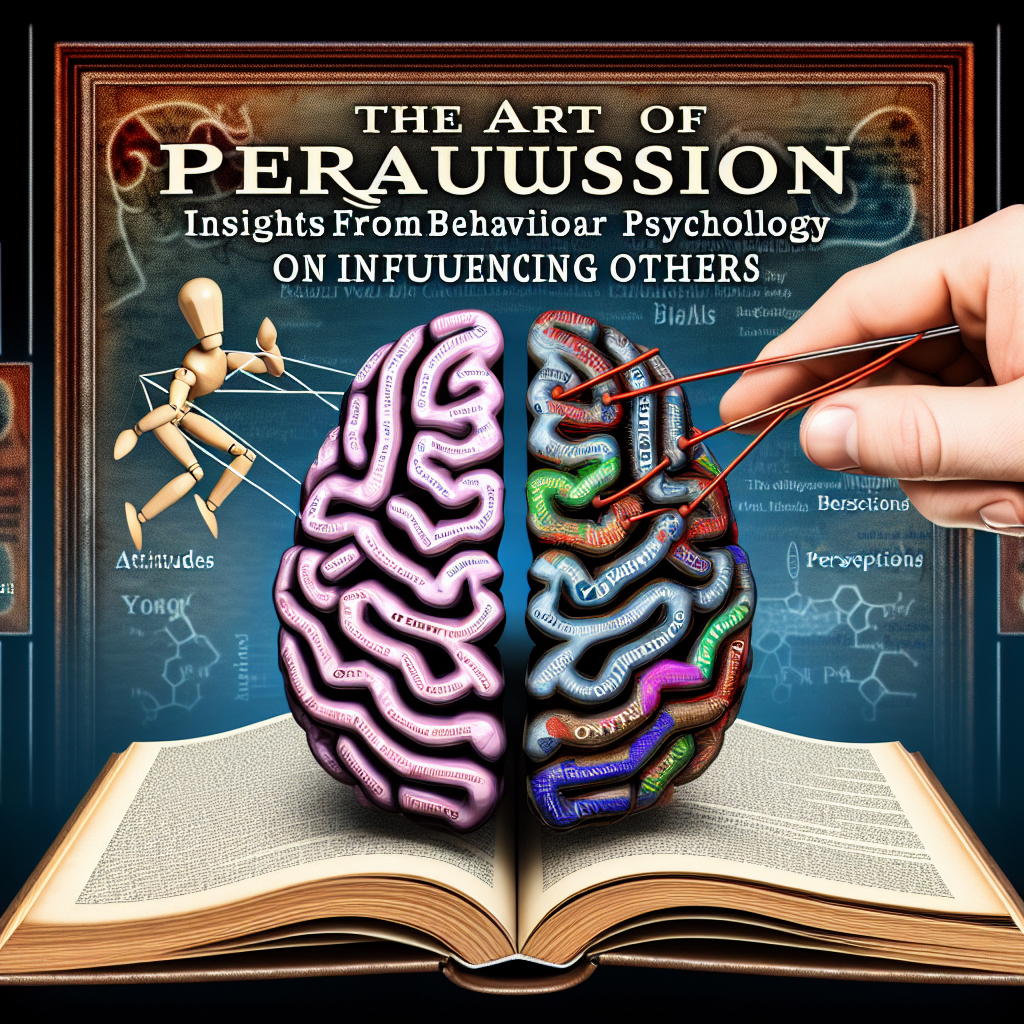
The Art of Persuasion: Essential Insights from Behavioral Psychology on Influencing Others
Introduction
In a world flooded with information and opinions, the ability to persuade effectively is not just a skill; it’s an essential art form. Whether in personal relationships, business negotiations, or public speaking, understanding The Art of Persuasion: Insights from Behavioral Psychology on Influencing Others can transform interactions and lead to successful outcomes. This article will delve deep into the psychological principles that underpin persuasion, revealing powerful insights that can be applied universally.
Understanding the Psychology of Persuasion
The Foundation of Behavioral Psychology
Behavioral psychology examines how thoughts, feelings, and actions interrelate, offering crucial insights into human behavior. Among the core theories of behavioral psychology are classical conditioning, operant conditioning, and social learning theory. These concepts can help us understand the mechanisms of persuasion:
- Classical Conditioning: Associating a stimulus with a response.
- Operant Conditioning: Encouraging desired behaviors through reinforcement.
- Social Learning Theory: Learning from observing others.
These principles provide a foundational understanding of how persuasion works and how you can effectively influence others.
Key Influencing Techniques
Reciprocity: The Give and Take
- Explanation: People are more likely to comply with a request if they feel they are giving back something of equal value.
- Application in Real Life: A grocery store offering a free sample can drive sales. Case studies show that customers who receive a sample often feel indebted and are likely to purchase the product.
Commitment and Consistency: The Power of the Small Ask
- Explanation: Once someone commits to something small, they are more likely to agree to larger requests later.
- Application in Real Life: Consider a political campaign that starts with a simple action like signing a petition, followed by larger contributions or volunteer efforts.
Commitment Stage Potential Outcome Signing a Petition Increased likelihood of donations Small Donation Larger future contributions Social Proof: The Bandwagon Effect
- Explanation: When people see others engaging in a behavior, they are more likely to do the same.
- Application in Real Life: Yelp reviews often drive new customers to restaurants; positive reviews create a sense of trust and validation.
Authority: The Trust Factor
- Explanation: People are more likely to comply with requests made by recognized experts.
- Application in Real Life: Health campaigns that involve doctors endorsing vaccines see higher compliance rates due to authority.
- Scarcity: The Fear of Missing Out
- Explanation: Limited availability increases desirability.
- Application in Real Life: Promotional deals that suggest limited-time offers (e.g., “Only 2 left in stock!”) can drive impulse purchases.
Case Studies That Illustrate Persuasion in Action
Case Study 1: The IKEA Effect
The IKEA effect describes how people place a higher value on products they helped create. A study showed that participants who assembled furniture themselves rated it more highly than those who didn’t.
- Analysis: This illustrates the power of commitment and the desire for ownership, relevant principles detailed in The Art of Persuasion: Insights from Behavioral Psychology on Influencing Others.
Case Study 2: The Stanford Prison Experiment
Conducted by Philip Zimbardo in 1971, this infamous study illustrated how situational factors influence behavior and authority perceptions.
- Analysis: This highlights social proof’s impact, as participants conformed to their roles as guards or prisoners, demonstrating how context alters behavior and perceptions.
Case Study 3: The “Foot-in-the-Door” Technique
A study demonstrated that individuals who agreed to small requests were more likely to comply with larger requests later.
- Analysis: This case emphasizes the commitment and consistency principle, a key insight in The Art of Persuasion: Insights from Behavioral Psychology on Influencing Others.
The Role of Emotional Intelligence in Persuasion
Emotional intelligence (EQ) is crucial for effective persuasion. Understanding and managing your emotions, alongside those of others, can significantly influence outcomes. High EQ enables individuals to:
- Build rapport quickly.
- Navigate complex social dynamics.
- Adjust their approaches based on feedback.
Developing Emotional Intelligence
- Self-awareness: Recognizing your emotions and triggers.
- Empathy: Understanding others’ feelings and perspectives.
- Social Skills: Building and maintaining relationships.
By enhancing emotional intelligence, you augment your ability to persuade effectively, ultimately refining The Art of Persuasion: Insights from Behavioral Psychology on Influencing Others.
Leveraging Feedback: Continuous Improvement
Taking feedback into account is vital for honing persuasive strategies. Here’s a practical approach:
| Feedback Source | Application |
|---|---|
| Peer Reviews | Refine pitches and presentations. |
| Audience Engagement | Adapt content to better resonate. |
| Self-Reflection | Assess outcomes for future strategies. |
Conclusion
Mastering The Art of Persuasion: Insights from Behavioral Psychology on Influencing Others is not just about having the right techniques; it’s about understanding the human psyche. From the core principles of psychological behavior to real-world applications and emotional intelligence, this formidable skill can shape outcomes in various aspects of life.
Final Takeaway
Begin experimenting with these persuasive strategies today. Whether you want to win a debate, negotiate a deal, or bring people together for a cause, the art of persuasion is at your fingertips. Remember: true persuasion is rooted in understanding, empathy, and a genuine desire to connect with others.
FAQs
1. What is the definition of persuasion in psychology?
Persuasion in psychology refers to the process of influencing someone’s beliefs, attitudes, or behaviors through communication, often incorporating emotional and cognitive elements.
2. How can I become more persuasive?
Start by practicing active listening, understanding emotional cues, and applying the principles of reciprocity and commitment to build connections.
3. Are there any ethical considerations when persuading others?
Yes, ethical persuasion should respect individuals’ autonomy and not manipulate or deceive them. Authentic motivation and transparency are key.
4. Can persuasion be learned, or is it an innate ability?
Persuasion can be learned through practice and understanding psychological principles. While some may have a natural inclination, anyone can improve their persuasive skills.
5. How important is body language in persuasion?
Body language plays a crucial role in communication. Non-verbal cues can significantly enhance or undermine your persuasive efforts, as they often convey more than words alone.
Whether you’re aiming to improve your persuasive skills in your career or personal life, the principles from behavioral psychology provide actionable insights that can lead you to success. Engage with these strategies and watch as your influence grows!

















